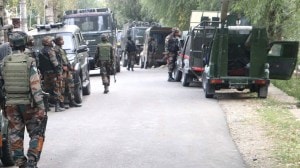- India
- International
Women adivasis to SC: Repression continues against those seeking rights under FRA
Sokalo Gond was among those campaigning for reclaiming adivasis’ rights to forest land even before the legislation in 2006.
 Contending that the FRA for the very first time vested tribal women equal and independent rights over forests and forest land while revenue and all other land laws vest this right on women only after marriage, the application says that regardless of the number of pending appeals and claims that are still to be appealed, it is not within the purview of the Act to allow for eviction of people by terming them encroachers. (Representational Image)
Contending that the FRA for the very first time vested tribal women equal and independent rights over forests and forest land while revenue and all other land laws vest this right on women only after marriage, the application says that regardless of the number of pending appeals and claims that are still to be appealed, it is not within the purview of the Act to allow for eviction of people by terming them encroachers. (Representational Image)
TWO ADIVASI women leaders of their communities have sought to describe to the Supreme Court the continuing repression faced by tribals and other forest-dwelling communities in seeking their rights to forest land under the Forest Rights Act (FRA), 2006.
The intervention application, filed by Sokalo Gond of Sonbhadra and Nivada Rana of Lakhimpur Kheri in Uttar Pradesh, along with All India Union of Forest Workings People (AIUFWP) and Citizens for Justice and Peace (CJP) led by Teesta Setalvad, is one among nearly 15 interventions filed in the writ petition in the SC regarding the constitutionality of the Scheduled Tribes and Other Forest Dwellers (Protection of Rights) Act, 2006.
Gond was among those campaigning for reclaiming adivasis’ rights to forest land even before the legislation in 2006. Rana is a Tharu Adivasi woman leader in the Dudhwa National Park region on the Nepal border and is vice-president of the Tharu Adivasi Mahila Majdur Kisan Manch.
The plea says that under the AIUFWP, tribals have so far collectively reclaimed more than 1 lakh hectares that is now being cultivated collectively under the leadership of women in Sonbhadra, Mirzapur, Chanduali, Chitrakoot, Lakhimpur Kheri, Lalitpur, Bhariach, Pilibhit, in the Shivalik area of Uttrakhand, Bihar, Jharkand, Bundelkhand in MP and the Sundarbans of West Bengal.
Contending that the FRA for the very first time vested tribal women equal and independent rights over forests and forest land while revenue and all other land laws vest this right on women only after marriage, the application says that regardless of the number of pending appeals and claims that are still to be appealed, it is not within the purview of the Act to allow for eviction of people by terming them encroachers.

“Under British colonial rule, at least around 150 indigenous tribes were brutally criminalised by a foreign and hostile administration, which also gave permission to the police and administration to constantly monitor them. The demand for timber made the British exploit the habitat of these communities for commercial ends,” the application says. It added that before the legislation, a nexus of local mafia, police and forest officials systematically exploited and oppressed forest-dwelling communities. Despite the enactment of the FRA, this nexus continues to prevail, it says.
The application cites the 2010-11 report by the Standing Committee on Social Justice and Empowerment of the 15th Lok Sabha that made a scathing indictment of the Ministry of Tribal Affairs for not implementing the law rigorously. It also cites two communications to state governments by the Ministry of Tribal Affairs, in 2014 and 2018, regarding resolving the problematic methodology being employed by the bureaucracy in various states regarding claims under the FRA, their pendency and rejections.
Adivasis trying to wrest their rights under the law have faced resistance from those with vested interests, it says.
In June 2018, during a movement in Sonbhadra by adivasis and villagers, led by women like Sokalo Gond seeking rights under FRA, the state police detained Gond and another leader Kismatiya Gond. “This prompted the organisations, AIUFWP and Citizens for Justice and Peace (CJP) to file a Habeas Corpus petition in the Allahabad High Court. The court not only directed explanation from the authorities for the detention, but also ordered that the women be produced before it. The women were not produced and while the police claimed they released the them, they remained untraceable for a long while. Finally, after persistent efforts, she was released from the Mirzapur Jail, in November 2018,” the application says.
Gond, along with members of 15 other gram sabhas, have filed claims for community forest rights in March 2018, in which women are primary claimants. Women today are undertaking collective cultivation and preservation of natural resources here. Nivada Rana has also participated in filing a community forest rights claim in July 2013, supported by documentation on grounds that women should be the first owners of the natural resources. “But to date no community rights have yet been conferred to women in Dudhwa,” the application says.
Apr 18: Latest News
- 01
- 02
- 03
- 04
- 05






































